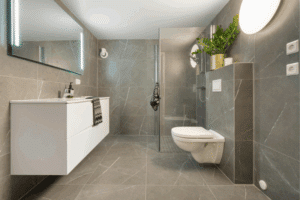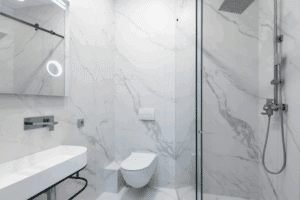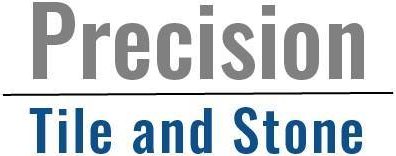If you’ve been wondering is ceramic or porcelain is better for shower walls in Birmingham, AL, you’re not alone. Choosing the right tile is more than just a design decision; it’s about ensuring your shower can withstand Birmingham’s unique climate. With hot, humid summers and mild but damp winters, and daily exposure to moisture, your shower walls require materials that resist water, prevent mold, and maintain their beauty over time.
Both ceramic and porcelain tiles can create a stunning bathroom, but they’re not the same. Understanding their differences will help you make the right choice for your home, your budget, and your lifestyle.

1. Water Resistance: Why It Matters in Birmingham
Porcelain:
Porcelain is made from fine, dense clay and baked at very high temperatures. This makes it absorb less than 0.5% of water, so it’s almost waterproof. In Birmingham’s humid climate, this is a big advantage because it helps prevent dampness, mildew, and mold.
Ceramic:
Ceramic is also clay-based, but it’s less dense and more porous. While a quality glaze can make ceramic resistant to water, it’s still not as impervious as porcelain. Over years of daily shower use, especially in a humid environment, water can seep through micro-cracks in the glaze and cause issues behind the tile if not maintained properly.
Verdict: For maximum water resistance in Birmingham bathrooms, porcelain wins.
2. Durability and Lifespan
Porcelain:
Dense and extremely hard, porcelain stands up to chips, scratches, and cracks better than ceramic. If you’ve got a busy household or if your shower gets heavy use, porcelain’s toughness can mean fewer repairs and a longer lifespan.
Ceramic:
Ceramic tiles are still durable and perfectly fine for many homes, but they’re softer and more prone to chipping if something heavy falls against them.
Verdict: Porcelain offers superior durability, making it a better long-term investment for high-use showers.
3. Maintenance Requirements
Porcelain:
Thanks to its density and low porosity, porcelain is naturally resistant to stains and easier to keep clean. It doesn’t require sealing, which is one less chore on your to-do list.
Ceramic:
Ceramic can be easy to maintain if glazed, but grout lines will need sealing and periodic upkeep. Without that maintenance, moisture can get through and cause problems.
Verdict: Porcelain needs less care over time, which is a plus in Birmingham’s humidity.
4. Cost and Installation
Porcelain:
Porcelain typically costs more than ceramic, not just in material but also in installation. Its density makes it harder to cut, which can slow down the installation process and increase labor costs.
Ceramic:
Ceramic is more budget-friendly and easier to work with, which can mean significant savings if you’re tiling a large area or remodeling on a tight budget.
Verdict: Ceramic wins for affordability, but porcelain may save money in the long run due to reduced maintenance and repairs.
5. Style and Design Options
Both:
Both ceramic and porcelain come in a wide variety of colors, finishes, and styles, from sleek modern looks to classic stone or marble effects. Porcelain often excels at mimicking natural materials with incredible realism, while ceramic delivers beautiful results at a lower price point.
Verdict: Tie — it’s all about your design vision.
Climate Considerations for Birmingham Homes
Birmingham’s hot, humid summers mean your shower is already dealing with moisture before you even turn on the water. Combine that with seasonal temperature fluctuations that can cause minor expansions and contractions in building materials, and you need a tile that resists water penetration and holds up to environmental stress.
Porcelain’s density and low water absorption rate make it an ideal choice for these conditions, reducing the risk of water damage, mold, and warping over time. Ceramic can still work well if installed correctly and maintained with regular sealing, but it’s more vulnerable to moisture-related issues in the long run.

Conclusion
In Birmingham’s hot, humid climate, porcelain generally outperforms ceramic for shower walls thanks to its superior water resistance, durability, and low-maintenance nature. While ceramic can still be a beautiful and functional choice when installed and maintained correctly, porcelain’s ability to withstand moisture and wear over time makes it the more reliable long-term investment.
Ultimately, the best choice comes down to balancing your budget, style preferences, and willingness to maintain the tile, but for most Birmingham homeowners seeking lasting performance and fewer upkeep headaches, porcelain is the clear winner.

